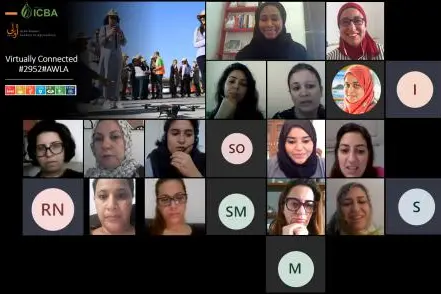PHOTO
Dubai – The International Center for Biosaline Agriculture (ICBA) has launched a virtual alumnae network for the Arab Women Leaders in Agriculture (AWLA) fellowship program.
Dubbed as Virtual AWLA Alumnae Association, the main aim of the initiative is to connect, enhance, and support research projects of women researchers from the Middle East and North Africa (MENA) region, and ultimately contribute towards improving food security and nutrition.
The association was launched by Dr. Tarifa Al Zaabi, Deputy Director-General of ICBA during the first virtual session of the network, which was attended by 18 of 22 members of the alumnae, in addition to ICBA scientists; the inaugural session was symbolized by a digital code (phoneword) for AWLA, 2952.
The participants discussed some of the most pressing challenges in marginal environments, including water scarcity and salinization. Home to about 70 percent of the world's extremely poor, the people living in these environments are most vulnerable to climate change effects on agriculture production? one of the primary sources of their livelihood.
In her message, Dr. Ismahane Elouafi, Director General of ICBA, said: "We are delighted to launch the virtual alumnae association for the AWLA fellows to accelerate the knowledge exchange between women researchers across the MENA region. Managed by ICBA, AWLA fellowship program is the first-of-its-kind in the MENA region and designed to empower women researchers to spearhead positive changes in agriculture and food security while addressing the challenges they face in their career. The first cohort included 22 women scientists from Algeria, Egypt, Jordan, Lebanon, Morocco, and Tunisia. They completed a 10-month program from 2019 to 2020, delivered through 12 online research and development modules and face-to-face workshops in Tunisia and the UAE."
For her part, Dr. Al Zaabi, highlighted the significant role that women researchers could play, especially during the unprecedented times of Covid-19 pandemic – it's challenges, solutions, and impact.
Dr. Al Zaabi also emphasized the importance of awareness campaigns, digitalization, and partnerships to support small and micro agricultural projects, particularly in the MENA region.
As a result of capstone projects developed during the fellowship program, the members presented various solutions they seek to implement during the difficult period of a global pandemic. They highlighted that in many cases, the current challenges might affect, among other things, agriculture, health, economy, and politics.
For example, Dr. Farah Baroudy, an AWLA alumna from Lebanon, who works as an agricultural engineer in Lebanon, shared an excellent initiative that helps to raise awareness about the importance of home farming in Lebanon. The initiative could contribute towards promoting the self-sufficiency of many families, especially during conflicts and these challenging times.
Another alumna, Mrs. Raghia Ezzaiare, project manager in Morocco, emphasized to work with decision-makers to enhance the role of cooperatives in promoting farmers' crops and enable smallholder farmers financially to overcome the current crisis. For her part, Dr. Rim Nefissi Ouertani, assistant professor from Tunisia, highlighted the importance of developing smart programs and platform that connects farmers with suppliers to achieve added value for farmers and small agri-businesses.
The first session of the network concluded with a recommendation to strengthen the efforts of Arab women researchers in agriculture and development, especially in the times of current crisis, where it's essential to engage youth in various vital sectors.
Funded by the Islamic Development Bank (IsDB), the Bill & Melinda Gates Foundation and CGIAR Research Program on Wheat, AWLA contributes to the achievement of the United Nations Sustainable Development Goals on Gender Equality (SDG 5), Climate Action (SDG 13), Life on Land (SDG 15), and Partnerships for the Goals (SDG 17).
-Ends-
Press enquiries:
Mr. Showkat Nabi Rather, ICBA: s.rather@biosaline.org.ae , or +971 55 137 8653
About ICBA
The International Center for Biosaline Agriculture (ICBA) is a unique applied agricultural research center in the world with a focus on marginal areas where an estimated 1.7 billion people live. It identifies, tests and introduces resource-efficient, climate-smart crops and technologies that are best suited to different regions affected by salinity, water scarcity and drought. Through its work, ICBA helps to improve food security and livelihoods for some of the poorest rural communities around the world.
© Press Release 2020
Disclaimer: The contents of this press release was provided from an external third party provider. This website is not responsible for, and does not control, such external content. This content is provided on an “as is” and “as available” basis and has not been edited in any way. Neither this website nor our affiliates guarantee the accuracy of or endorse the views or opinions expressed in this press release.
The press release is provided for informational purposes only. The content does not provide tax, legal or investment advice or opinion regarding the suitability, value or profitability of any particular security, portfolio or investment strategy. Neither this website nor our affiliates shall be liable for any errors or inaccuracies in the content, or for any actions taken by you in reliance thereon. You expressly agree that your use of the information within this article is at your sole risk.
To the fullest extent permitted by applicable law, this website, its parent company, its subsidiaries, its affiliates and the respective shareholders, directors, officers, employees, agents, advertisers, content providers and licensors will not be liable (jointly or severally) to you for any direct, indirect, consequential, special, incidental, punitive or exemplary damages, including without limitation, lost profits, lost savings and lost revenues, whether in negligence, tort, contract or any other theory of liability, even if the parties have been advised of the possibility or could have foreseen any such damages.




















